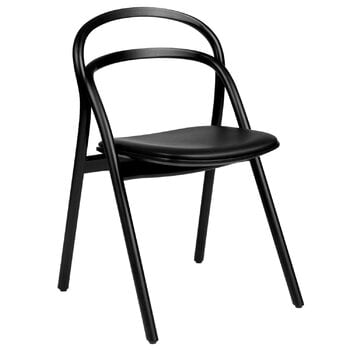Hem’s Udon chair combines classic Scandinavian design and Japanese woodworking traditions with a supremely skilful and functional result. The soft curves and simplified yet refined look of the chair make it a timeless piece, that will find its place both at a dining table or in an office. Designed by Staffan Holm, the upholstered Udon chair is crafted out of beech and high-quality Scandinavian leather, underscoring the gentle mood of the seat with their natural details.
Udon chair, black - black leather
Hem
Description
Hem’s Udon chair combines classic Scandinavian design and Japanese woodworking traditions with a supremely skilful and functional result. The soft curves and simplified yet refined look of the chair make it a timeless piece, that will find its place both at a dining table or in an office. Designed by Staffan Holm, the upholstered Udon chair is crafted out of beech and high-quality Scandinavian leather, underscoring the gentle mood of the seat with their natural details.
Product details (11)
- Colour
- Black
- Width
- 51 cm
- Depth
- 50 cm
- Height
- 80 cm
- Seat depth
- 45 cm
- Seat height
- 48 cm
- Frame material
- Black stained beech
- Seat cushion
- Foam
- Upholstery fabric
- Top-Grain Semi-Aniline Scandinavian Leather. Acquires a beautiful patina over time.
- Weight
- 5.84 kg
- Notes
- The leather color may vary slightly from piece to piece.
- Product ID
Designer
Staffan Holm (b. 1977) is a Swedish designer, who lives in Gothenburg and works widely with interior, industrial and furniture design. Holms aim is to evoke feelings with the products he has designed and to get people to fall in love and to get attached with them.
View all productsReviews (0)
Sustainability
The Product Sustainability Framework, our criteria of sustainable design, helps you find the most sustainable products in our selection. Read below which sustainability criteria this product has met.
Working conditions & labour 8/9
-
Equal opportunities for all employees
-
Commitment to UN Global Compact, fair compensation for all employees
-
Corporate responsibility requirements defined and communicated for suppliers
-
Systematic work for improved inclusion and well-being in the workplace
-
Transparent supply chain
-
Suppliers' compliance to a code of conduct ensured
-
Compliance to the UN Guiding Principles on Business and Human Rights ensured in the supply chain
-
Support for community involvement in the supply chain
-
Direct suppliers audited and certified
Eco-friendly production 8/9
-
Fair and resource-wise water-use in production
-
No incineration or landfilling of returned items
-
No use of endangered species as materials
-
No direct environmental emissions or waste (excl. GHGs) from production
-
The sustainability of direct suppliers' production is addressed and monitored
-
Production and material sourcing that respect biodiversity, animal rights, and natural ecosystems
-
Material-efficient and ecological packaging
-
No potentially harmful chemicals used in own production
-
Positive impact on nature’s well-being through operations that regenerate natural ecosystems
Climate impact 4/8
-
Company's direct greenhouse gas emissions identified and commitment to reduction
-
Product's carbon impact identified and commitment to reduction
-
Guidance on energy- and eco-efficient use of the product
-
100 % renewable energy in own production and operations
-
Contribution to climate initiatives beyond the brand’s direct operations
-
Low-carbon or compensated transportation
-
Carbon footprint of the product calculated and goals set to reduce it
-
Carbon neutral or carbon negative product
Sustainable materials 6/6
-
Sustainable and long-lasting material choices
-
No harmful or hazardous substances
-
Responsible raw material sourcing and production
-
Materials suited for circularity: monomaterials, recyclable finishings, renewable or recycled contents etc.
-
Ecological materials: natural, biodegradable, recyclable or recycled contents
-
Outstanding materials in terms of innovativeness, responsibility, sustainability and circularity: local production or sourcing, 100 % recycled content, C2C-certification etc.
Circular design 4/5
-
High aesthetic quality promoting long-term use of the product
-
Technically durable product design and material choices
-
Design for enduring life-long quality
-
Design and support for product maintenance, repair and upgradability
-
Innovative circular design solutions: circular service system, resale platform, remanufacturing, collection of used products, etc.















